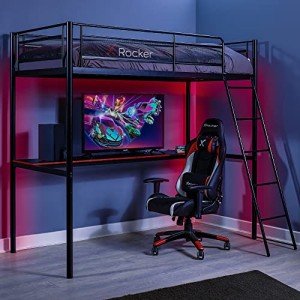
Bunk Beds Sale: A Comprehensive Guide to Choosing the Right Bunk Bed for Your Home
Bunk beds have actually long been a staple in children's bed rooms, using a mix of space-saving effectiveness and fun. Whether accommodating brother or sisters, good friends on slumber parties, or merely maximizing a playroom, bunk beds have actually become an important element in modern household homes. As sales on bunk beds rise, it becomes increasingly crucial for customers to make educated choices when purchasing one. This short article will cover the basics of acquiring a bunk bed, from types to safety features, along with pointers for keeping the integrity of your investment.
Types of Bunk Beds
When thinking about a bunk bed sale, it's important to comprehend the different styles readily available on the market. Below are the most typical types:
Traditional Bunk Beds: These include 2 beds stacked one above the other, sharing a single frame. They are typically the most cost-effective alternative.
L-Shaped Bunk Beds: This style features one bed placed vertically and another horizontally. This plan develops additional space below the upper bed, which can be used for storage or a play area.
Lofted Beds: Similar to standard bunk beds however without any lower bed. Instead, the space beneath can be used for a desk, play area, or extra storage.
Triple Bunk Beds: For households with a bigger number of kids or frequent sleepovers, triple bunk beds supply three sleeping locations in a space-efficient style.
Futon Bunk Beds: These styles merge bunk beds and futon sofas. The bottom section converts into a different seating location, enhancing performance.
Convertible Bunk Beds: These beds can be separated into 2 specific beds, making them versatile as kids's requirements alter gradually.
Table 1: Comparison of Bunk Bed Types
| Type | Description | Space Efficiency | Extra Features |
|---|---|---|---|
| Traditional Bunk Bed | Two beds stacked vertically | High | Most basic style |
| L-Shaped Bunk Bed | One vertical and one horizontal bed | Moderate | Play or storage space |
| Lofted Bed | Elevated bed with open space listed below | High | Work/play area |
| Triple Bunk Bed | 3 stacked beds | Really High | Accommodates more users |
| Futon Bunk Bed | Bunk bed with a convertible futon | High | Multi-functional |
| Convertible Bunk Bed | Can be divided into two separate beds | Moderate | Flexibility & & longevity |
Safety Features to Consider
Safety is paramount when investing in a bunk bed. Below are crucial safety features to try to find:
Guardrails: Adequate guardrails need to be present on both sides of the upper bunk to prevent falls. They should be at least 5 inches higher than the mattress.
Ladder Design: Look for sturdy, large ladders with slip-resistant rungs. Guarantee that the angle is not too steep for simple gain access to.
Stability: Ensure the bed is constructed with strong products, such as strong wood or durable metal. The bed ought to not wobble when in usage.
Weight Limit: Check the weight capacity of the bunk bed to ensure it can accommodate the desired users safely.
Material Safety: If possible, select beds made from non-toxic materials or those meeting safety requirements for kids's furnishings.
Table 2: Essential Safety Features
| Feature | Description | Importance |
|---|---|---|
| Guardrails | Sides of upper bed to prevent falls | Vital for kid safety |
| Ladder Design | Strong, slip-resistant rungs | Help safe and easy access |
| Stability | Construct quality to avoid wobbling | Makes sure security and durability |
| Weight Limit | Maximum weight capability | Prevents mishaps |
| Material Safety | Non-toxic, safe products | Safeguards kids's health |
Maintenance Tips for Bunk Beds
To extend the life of your bunk bed and ensure continuous security, consider the following maintenance ideas:
Regular Inspections: Periodically check the structure for loose screws, bolts, or any signs of wear. Tighten up fasteners as necessary.
Tidy Periodically: Dust and clean the surfaces regularly. Use appropriate cleaners that won't harm the surface.
Inspect Weight Limits: Be mindful of weight limitations, especially with older kids or adults who may wish to use the upper bunk.
Avoid Climbing on Guardrails: Educate kids not to use guardrails for climbing up or playing to minimize the risk of mishaps.
Frequently Asked Questions (FAQs)
Q1: What is the age limitation for children to securely use bunk beds?A: While it differs by the manufacturer, numerous recommend that kids under 6 need to not sleep in the upper bunk due to security issues.
Q2: How can parents discourage hazardous climbing?A: Setting clear guidelines about bunk bed use and monitoring children can help. In addition, utilizing a bed tent can prevent climbing up while creating a fun sleep environment.
Q3: What should I consider when decorating a space with bunk beds?A: Ensure there is sufficient space around the bunk bed for safe motion, and use the decor to develop personalized spaces for each kid.
Q4: Is a lofted bed appropriate for older children?A: Yes, lofted beds can be suitable for older kids as long as they satisfy security requirements and the kid is accountable enough to use them securely.
Bunk beds serve a functional function while adding an element of fun to a child's bedroom. As sales of bunk beds continue to rise, careful factor to consider of types, security functions, and upkeep practices is essential for moms and dads and caregivers. By understanding these important aspects, households can discover the ideal bunk bed for their home, guaranteeing both practicality and safety for years to come. Whether it's for brother or sisters sharing a space or creating a relaxing pajama party space, a well-chosen bunk bed can supply pleasure and practicality, making it a deserving financial investment.


